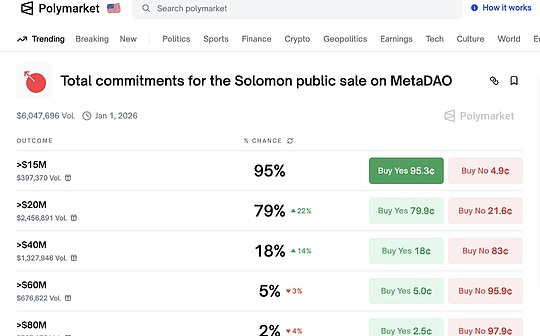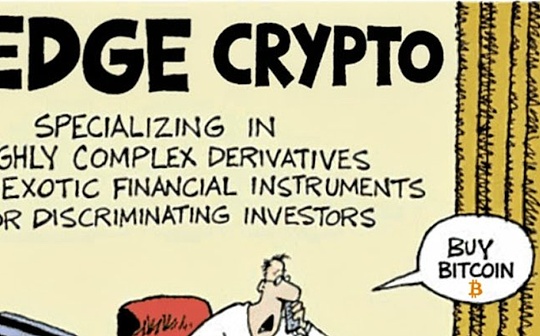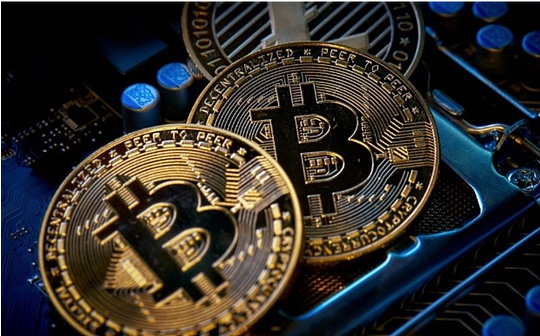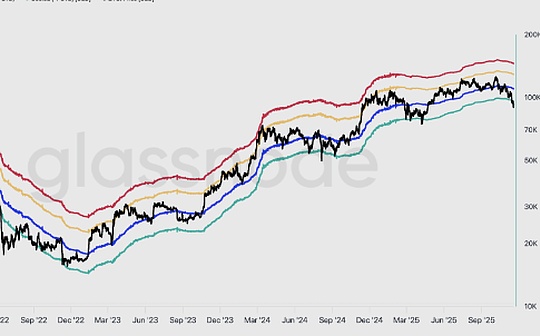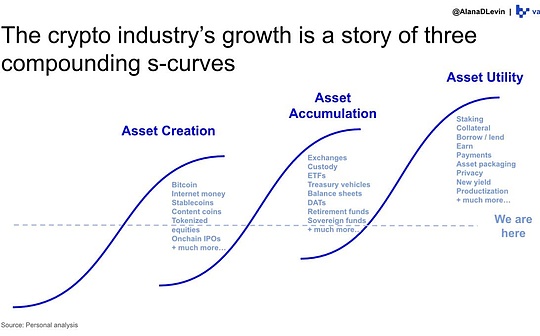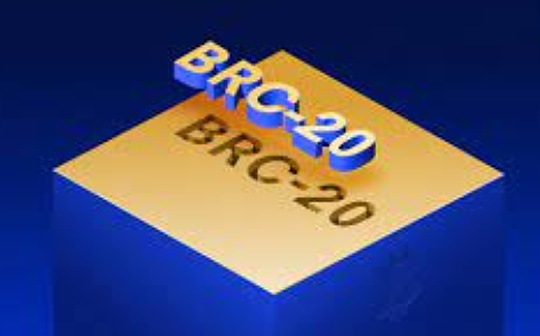
Written article: 0xxz@:
Just year in 2024, the successful BRC20 in 2023 will be split?
what happened
On January 2, 2024, Unisat announced that it would follow the Ordinals Jubilee upgrade to confirm that the BRC-20 is still on Ordinals without splitting into an isolated agreement.In addition, the White Paper will be released on January 31, 2024. This may be the most important gifts that we can provide BRC-20, Ordinals, Bitcoin and the community since February last year.
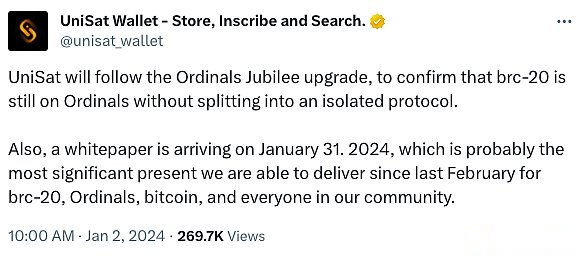
BRC20 standard founder Domo immediately pushed, saying,UNISAT is rushing to make these updates reckless, ignoring its peer indexes, and may damage a broader BRC20 user community.He also accused it of being part of Unisat’s thoughtful and continuous strategy, aiming to obtain control over the agreement, and pleaded to the BRC20 community to collectively reject the fork proposed by UNISAT.
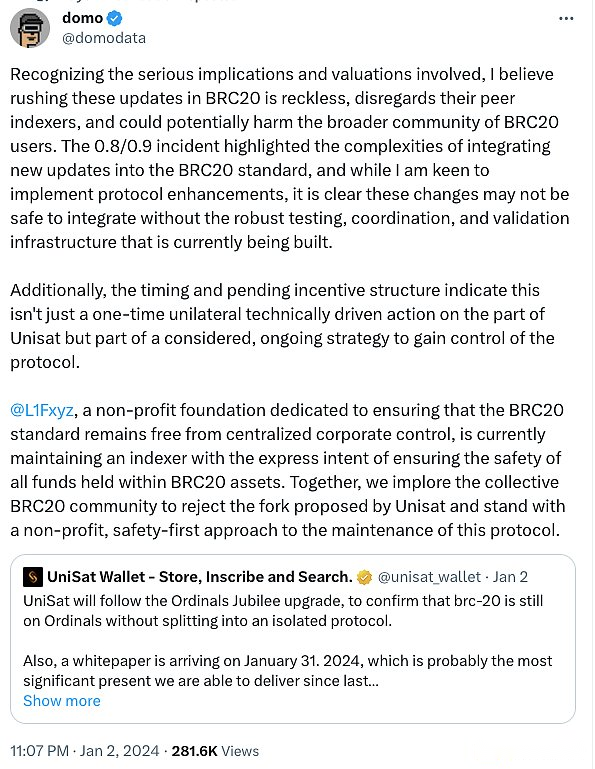
Realizing the serious impact and valuations involved, I think it is reckless in the BRC20 to promote these updates.Ignore its peer indexes, And may damage a wider BRC20 user community.The 0.8/0.9 incident highlights the complexity of the new update to the BRC20 standard. Although I am keen to enhance the agreement, it is clear that if there is no strong testing, coordination and verification infrastructure, these changes may not be able to integrate safely.It is currently under construction.In addition, the time arrangement and the unrequited incentive structure show thatThis is not just Unisat’s unilateral technology -driven operation, but part of the thoughtful and continuous strategy, aiming to obtain control over the agreement.
L1 FoundationIt is a non -profit foundation that is committed to ensuring that the BRC20 standard is not controlled by centralized companies.AimalizeA index is being maintained beforeIts clear purpose is to ensure the security of all funds held in the BRC20 assets.We together begging the BRC20 community to collectively reject the fork proposed by Unisat and support the protocol in a non -profit and safety way.
Ordinals founder Casey also joined the battlefield fire on January 3, announcing the launch of ORD 0.14.0, which will be the last version of the previous version of the Jubilee.
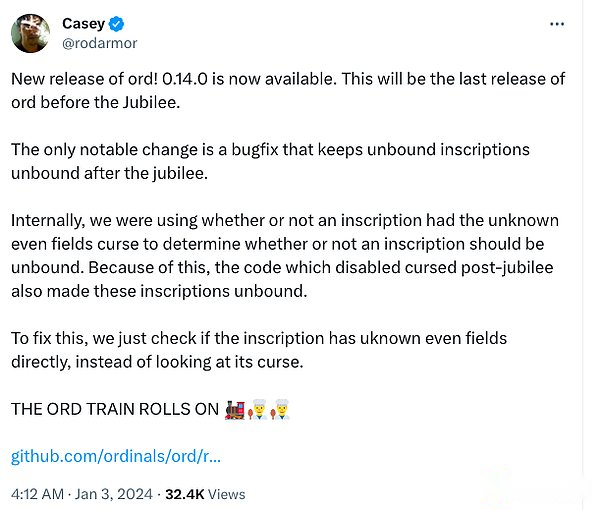
ORD 0.14.0 is now launched.This will be the last release of Jubilee before.
The only notable change is an error repair. The error repair keeps the unbounded inscription remain unbound after Jubilee.Internally, we use the inscription to have an unknown puppet cursing to determine whether the inscription should be lifted (Cursed Inscriptions, cursing inscriptions caused by a bug before the Ordinals protocol, which caused some inscriptions to be identified by the indexes. Therefore, the Ordinals team decided to decideThe cursed inscriptions are assigned to negative values from 0, so they are also called negative inscriptions).Because of this, the curse code after the upgrade of the Jubilee is also invalidated by these inscriptions.To solve this problem, we only need to directly check whether there is an unknown even unknown segment instead of viewing its curse.ORD train has started https://github.com/ordinals/ord/r Eleases/Tag/0.14.0
Ordinal market Bioniq CEO Bob Bodily posted a post calledBRC20 index warrior war,And the background combing and expressed personal views on the debate between Unisat and Domo:
BRC20 index warrior war:What is the key to arguing
First, make a rapid summary of BRC-20:
The BRC-20 is by far the most successful FT token protocol on Bitcoin.Last year’s transaction volume was hundreds of millions of dollars even if it was not billions of dollars.It is not perfect (using inefficient codes to expand UTXO sets, which are currently limited), but it is very easy to deploy and cast tokens, and inspire the inscription of the entire encrypted world on almost every chain.
Second, the technology is quickly introduced:
The BRC-20 is a meta protocol built based on the Ordinals meta-protocol, and the Ordinals Metropolitan Protocol is based on Bitcoin.This means that Ordinals uses Bitcoin as the complete data availability layer and uses a linked indexer to determine the meta protocol status.The BRC-20 uses the Ordinals protocol as the complete data availability layer and has a linked indexer to determine the meta protocol state.This means that the BRC-20 is actually a yuan protocol because it is built on Ordinals.
Build the complexity of BRC-20 on the ORD:
The technical specifications of the Ordinals protocol have been changing last year.ORD is a new protocol, so it has changed a lot.When you build the tokens on the ORD, your agreement will increase additional risks because you have a transfer agreement as dependencies.This is what happened in ORD 0.8.0 and Ord 0.9.0.The way of tracking inscriptions of different versions of the REDs is slightly different, which means that the BRC-20 indexes will report incorrect balances, depending on whether they are built based on 0.8.0 and 0.9.0.Of course, this does not want to see.
L1 Foundation Solution
Layer 1 Foundation (L1F, BRC20 protocol starter Domo is one of the founders of L1F) is to freeze the ORD protocol version to 0.9.0 to prevent similar problems in the future.Therefore, even if we have other categories of curse inscriptions,By building all the indexes on version 0.9.0, you can avoid any non -compatibility of any cross -versionEssenceThis is not a permanent solution, but it is currently effective in maintaining the BRC-20 stability.
Unisat wants to promote the development of the agreement
First of all, Unisat launched the black and white module system.This enables people (such as Unisat) built on the BRC-20 to introduce new features in the black module (unjusted temporary position in the main agreement).You can put the tokens into the black module, but you cannot take it out before obtaining approval. It is essentially like the Bitcoin SpaceChain chain (unidirectional bridge).Then yesterday, UNISAT announced that they wanted to upgrade the latest version of the latest version of the RED version under the BRC-20 index.Jubilee is the formal version of ORD, and there will no longer be a curse inscription (all inscriptions will always be positive).
The key to dispute: How to upgrade the BRC-20
Upgrading the ORD version under the BRC-20 index is actually a very good idea.The ORD protocol will be more stable. We will no longer have a curse inscription, and we don’t have to worry about problems such as the balance of balance.
Unisat hopes to launch this agreement as soon as possible, because Unisat is a startup.The startup has no time to sit still.You must strive to find products suitable for the market and build for your users.
L1F hopes to postpone upgrades, because if we rush to upgrade, there may be more errors.Best in Slot and others have found some of the protocol errors.This makes sense, because L1F is the basis for protecting the protocol, so they can accept the slower and more purposeful protocol path to upgrade.
Some people think that this is a power game for the Unisat team to control the agreement.Others believe that L1F is only trying to control the protocol, and the agreement should be more driven by the market.
My opinion
Because the BRC-20 protocol has achieved incredible success, we can no longer act quickly.The start-up stage of the BRC-20 has ended.The BRC-20 is an absolutely huge protocol (TVL, user, infrastructure, wallet, market), and nothing should be completed quickly.I like the way from L1F.Domo has always realized the importance of the stability of protocol (the BRC-20 has not really changed since its birth), which is an advantage.It’s easier to integrate.It’s easier to build.etc.We need to be decentralized, thoughtful, and slowly progressing consensus and compromises to promote the development of the BRC-20 protocol.

